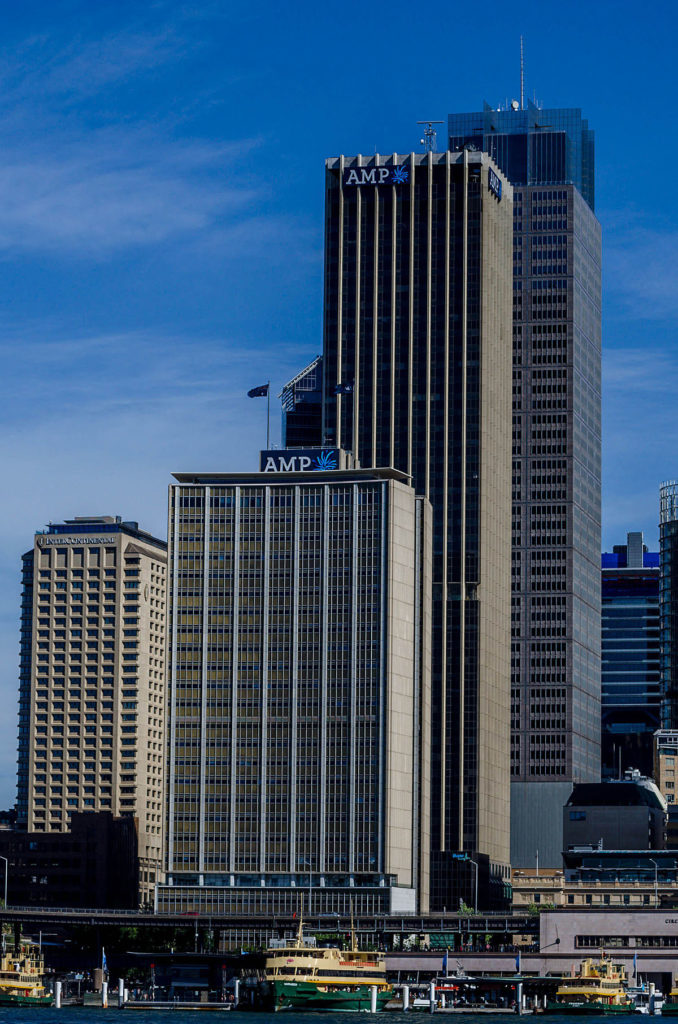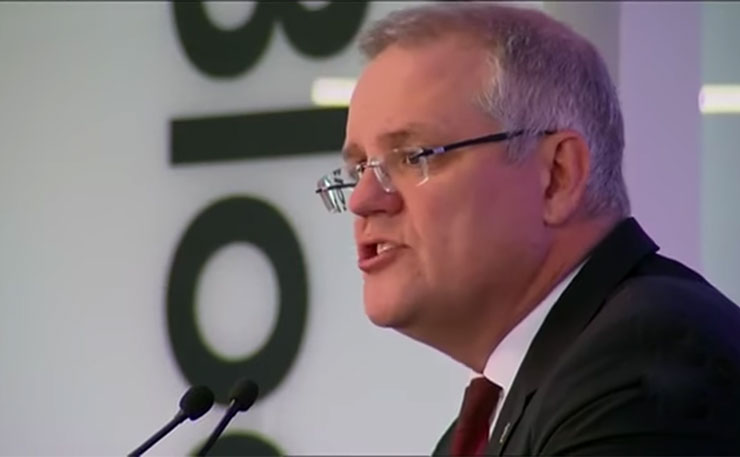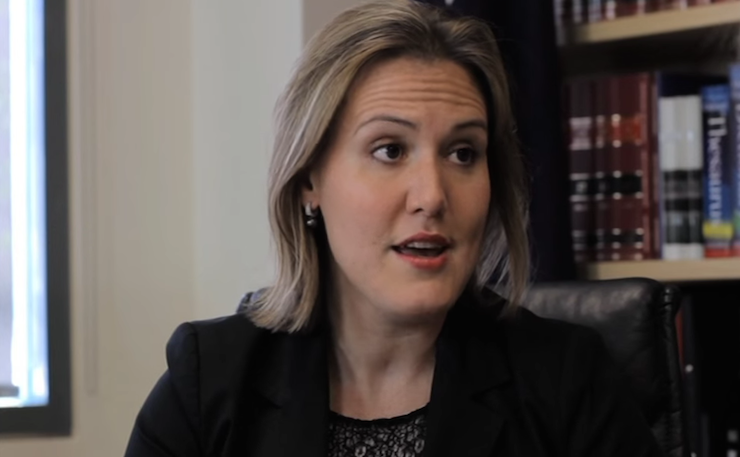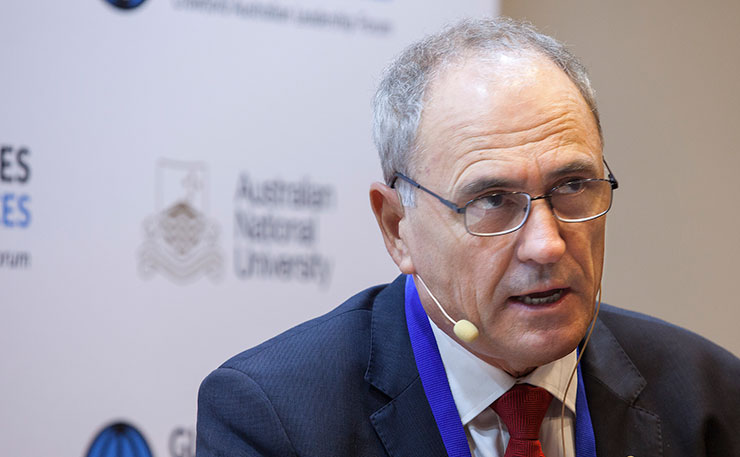The Banking Royal Commission has turned into an inquiry into the dark heart of Australian capitalism, writes Ben Eltham.
Can there be anyone in Australia who feels sorry for the banks right now? Australia’s big financial sector has rarely been popular, but the past fortnight has been something else again.
After more than a decade of banking impropriety, scandal and mismanagement, we all expected some dirty laundry to be aired in the Royal Commission into Misconduct in the Banking, Superannuation and Financial Services Industry. But recent revelations have shocked even seasoned observers.
The banking royal commission is quickly turning into one of the most significant events in Australian political economy in a decade. It heralds a sea-change in the way Australians understand the financial sector.
Banks occupy the commanding heights of the capitalist economy. They are a central protagonist of neoliberal theory. And they appear to be systemically corrupt.
We discovered that the Commonwealth Bank has been charging fees to dead people, for advice they never received. We heard a scarifying tale of a Westpac financial advisor telling a nurse to sell her house so she could pool her super in a bed-and-breakfast – an investment that was illegal under superannuation law. We learned that at least 353 employees at NAB had falsified forms of superannuation holders.

Most astonishingly, we found that investment giant AMP was systematically lying to corporate regulator ASIC, in a conspiracy to mislead that went all the way to the top. Not only was AMP charging clients for service it didn’t provide – the so-called “fees-for-no-service” scam – but AMP then misled the regulator, in a corporate cover-up that pulled in top law firm Clayton Utz. AMP’s CEO Craig Meller has already resigned, and chairwoman Catherine Brenner seems sure to follow.
On trial is nothing less than the entire edifice of Australian capitalism. For decades, the prevailing intellectual fashions amongst politicians and policymakers have favoured deregulation, self-regulation, or light-touch regulation. Heavy-handed government regulators were frowned upon; instead, the emphasis was on “responsive” and cooperative regimes that aimed to work with companies, not against them.
Corporate watch poodle ASIC is a perfect example. We’ve been writing about ASIC’s dismal record as a corporate regulator since at least 2012. The Commission has strong legal powers but a woeful record of investigation and prosecution. Time and again, ASIC has been asleep on the front porch while the corporate criminals walked past with the safe. The hapless regulator has been missing in action through the decade-long train wreck that led up to the current inquiry.
Name a corporate scandal in this country, and you can probably identify complacency or ineptitude at the corporate regulator. Storm Financial? Tick. Opes Prime? Tick. Trio Capital? CommInsure? Bank-bill swap fixing? Tick, tick, tick.
My favourite remains the Trio Capital debacle, where corporate crooks siphoned nearly $200 million from superannuation accounts to secret bank accounts in the Caribbean. Despite being notified about the crime, ASIC was too slow to stop the money disappearing; it also failed to keep the federal police or prudential regulator APRA in the loop. To add insult to injury, ASIC then decided not to pursue Trio’s ringleader, Jack Flader.
Even when crooks were eventually charged, they faced risibly light penalties: the notorious Emmanuel Cassamatis of Storm Financial was responsible for nearly a billion dollars in losses to his hapless customers. After 8 years of civil litigation from ASIC, he received a laughable $70,000 fine. Jail wasn’t even on the cards.
Underlying this ineptitude is a culture at ASIC that seems to prefer working with wrongdoers, rather than prosecuting them. In particular, ASIC prefers to use what it calls “enforceable undertakings” in which companies caught breaking the rules agree to a token fine and promise not to do it again. As last week’s testimony to the Royal Commission shows, enforceable undertakings hold little fear for large banks and finance companies.

AMP has become the flash point of the current scandal. The big insurance and finance firm “self-reported” its breach of finance rules to ASIC, after discovering it had been charging fees to clients without providing them with any actual services. In response, AMP promised to give ASIC an “independent report” documenting the malfeasance and explaining how it would stop it happening in the future.
As we found out at the Royal Commission, the “independent report” was a fraud. The report was not independent at all: AMP’s board negotiated no fewer than 25 drafts and 700 edits and changes with law firm Clayton Utz. The final document was profoundly misleading, lying to the corporate regulator about what was really going on.
It’s worth exploring the testimony of AMP’s chief of “advice”, Jack Regan, last Monday and Tuesday in some detail. The Royal Commission’s counsel Michael Hodge led Regan through a series of internal AMP documents and formal emails from AMP to ASIC. They demonstrated, in stark and unforgiving terms, the magnitude of AMP’s deception.
AMP wasn’t just charging clients fees for no service. It was charging those fees while telling ASIC it wasn’t. AMP was telling ASIC the fees were all just an “administrative error”, and that AMP had stopped charging them.
In fact, they weren’t an error at all: they were a calculated decision to keep charging the fees in breach of the regulations, and then lie to ASIC about them. It was far more than just a mistake: a series of senior AMP executives colluded to mislead the regulator in a sustained fraud that must surely eventually result in criminal charges being laid.
Regan’s testimony culminated in a devastating exchange in which Regan admitted AMP was intentionally breaking the law in order to make more money.
MICHAEL HODGE QC: Have you personally considered the question, Mr Regan, of to what extent these emails that we’ve been looking at reflect the culture of the advice section of AMP?
JACK REGAN: Yes, I have.
HODGE: And what is the view that you formed?
REGAN: I think there are reasons to be concerned. I think they show a culture that’s not as robust as it should be.
HODGE: When you say “not as robust as it should be”, that really understates it, doesn’t it?
REGAN: I think that the culture certainly needs to be reviewed and – and analysed. And we are doing that. In fact, there was a review of the culture done in 2015. But I think the concerns there are obvious.
HODGE: I just want to understand the way in which you perceive it. When you say “not as robust as it should be”, what we seem to be seeing is that a conscious decision is made to protect the profitability of AMP at the expense of complying with AMP’s licence. Do you agree?
REGAN: Yes, that’s – I believe that’s what that shows, yes.
HODGE: And is that type of behaviour what you mean when you say “a culture that is not as robust as it should be”?
REGAN: I – well, it’s clear that we preference the interest of shareholders in that exchange at the expense of clients. And so that is a concern, but I think there are other elements there that are concerning as well. I think there is clearly a lack of clarity in terms of the way in which directions are being given, but also there’s a concern about the degree to which things should have been escalated as a result of the issues being identified further down. So they would be three instances, I think, that relate to the cultural question.
HODGE: It’s also at the expense of complying with the law?
REGAN: Absolutely. Absolutely.
HODGE: And although you say it’s preferencing the interests of shareholders, by that, I take it, you mean at least in the short-term of maintaining the profitability of the company at the expense of complying with the law?
REGAN: Yes, that’s correct.
HODGE: Is it in the long-term interests of AMP shareholders for AMP to be maintaining its profitability at the expense of complying with the law?
REGAN: It is not.
Given the thorough questioning he was given by Senior Counsel Assisting Hodge, we can forgive Regan for this answer. But let’s face it: he’s lying. If the Royal Commission has shown anything so far, it is that it certainly is in the long-term interests of financial institutions to cheat their clients and then lie to the regulators about it.
Given how little enforcement ASIC seems to do, cheating and then paying a small fine is arguably the most profitable option.
In fact, AMP was so unafraid of ASIC that it thought it could bargain with them. The Clayton Utz report states that “we observed the stance of AMP in its interactions with ASIC was to seek to negotiate a commercial outcome with ASIC on the scope of the compensation payable to customers.”
AMP thought it could fess up, and cut a deal. This is not the sort of behaviour we’d expect from executives that fear criminal sanctions.
Of course, it goes without saying that there are political implications to the Royal Commission too. The inquiry has once again exposed the capture of the Liberal Party by the financial sector. Although the government was indeed eventually forced to announce the commission, the Coalition’s tooth and nail stance against a banking sector inquiry is a matter of public record.

Commentators have been having a field day lately digging up statements from the likes of Scott Morrison, Mathias Cormann and Kelly O’Dwyer claiming a royal commission was completely unnecessary. In 2016, for instance, O’Dwyer wrote a Fairfax opinion piece in which she claimed that “for the Labor Party to propose a royal commission into banks is reckless and ill-conceived.” Morrison told journalists at a 2016 press conference that “there is nothing that ASIC can’t do that a Royal Commission can do.” Cormann issued a media release that stated “we don’t need another inquiry.” Prime Minister Turnbull wrote to Bill Shorten after the 2016, asking him to abandon his calls for a royal commission. “The Government does not support the establishment of a royal commission into the financial services sector,” Turnbull wrote.
The links between the Liberal Party and the financial sector are not simply ideological and philosophical. They are personal and biographical. Malcolm Turnbull is a former merchant banker for Goldman Sachs. Kelly O’Dwyer is a former executive at NAB. Mathias Cormann is married to a lawyer at Clayton Utz. The big banks and financial institutions continue to donate millions to both major parties.
The government also tried repeatedly to roll back the Future of Financial Advice reforms, only failing to do so after being defeated by a technicality in the Senate. It is exactly the FOFA reforms that the banks and AMP fell foul of with their lucrative practice of charging people for advice they never received.
And no less a figure than Mathias Cormann argued bitterly against the FOFA reforms in the Senate, quoting – you guessed it – AMP’s Craig Meller.

The reason that AMP and the other big banks could charge these fees for phantom services was because of the lucrative and patently abused system of “trailing commissions” that has infected so much of the Australian finance sector. This is the system under which mortgage brokers and insurers can collect fees in return for selling customers a financial product, essentially forever. They are astonishingly profitable – particularly when you can collect them for doing nothing.
Mortgage brokers in particular rely on trailing commissions as one of their key revenue sources. Trailing commissions are calculated on a percentage basis, typically totaling 15 to 25 basis points of a home loan, paid every year by the customer as part of their repayments.
Two things leap out immediately. Firstly, trailing commissions on a new mortgage can run for 30 or more years. The longer the mortgage, the longer those commissions keep rolling in. Secondly, as with any fee calculated on a percentage basis, the larger the initial amount, the larger the fee. There is a massive incentive to sell the largest possible mortgage.
Mortgage brokers originate around half of all Australian home loans. To say this is a systemic issue is putting it mildly. But mortgages and commissions are just the half of it. The real issue is what the Royal Commission is showing us about the top echelons of Australian capitalism.

The people who run Australia’s big banks are the true power elite of Australian society. Men and women like NAB chairman Ken Henry, Macquarie Bank boss Nicholas Moore and AMP chair Catherine Brenner occupy the very top seats in the corporate hierarchy. They are paid millions, even tens of millions, and enjoy a thicket of directorships in other listed corporations.
Brenner, for instance, is the woman ultimately responsible for lying to ASIC in the Clayton Utz report. She also sits on the board of Coca Cola Amatil and the Art Gallery of New South Wales. A protégé of David Gonski, she is a high-profile member of Sydney’s executive milieu. Surely now Catherine Brenner’s position at AMP is untenable. She lied to the regulator: how can she remain the chair of AMP?
Or take NAB’s Ken Henry. As a former Secretary of the Treasury, Henry helped usher the nation through the global financial crisis. He then joined NAB’s board in 2015. Before and since, NAB has been up to its neck in corruption and impropriety.
A NAB trader colluded with a Bureau of Statistics officer to gamble on the money markets. Rogue planners ran amok in NAB’s Wealth division. NAB mortgage brokers had to be sacked after issuing “liar” loans. NAB traders also colluded with other big banks to manipulate the bank bill swap rate – the benchmark price for Australian money markets. Even though NAB pleaded guilty, needless to say, no-one went to jail.
Whatever you can say about Ken Henry’s career before joining NAB, you’d have to say his career since has been tarnished.
What about Andrew Mohl? The former CEO of AMP was boss when some of the worst behaviour inside the financial giant was occurring. He’s now a director of CommBank.
Or let us consider the example of AMP’s Brian Salter. Salter was the top lawyer at AMP while the “independent report” was cooked up between AMP and Clayton Utz. The tangled web only gets thicker: Salter also recently held a position at ASIC itself, on the Financial Services and Credit Panel. Almost unbelievably, Salter was even the best man at the wedding of former ASIC chair, Greg Medcraft.
It was New Daily’s Michael Pascoe who summed it up best. “Plot the careers and connections of the men and women directors and C-suite executives of the financial big six and you pretty much have Australian capitalism,” he wrote last week. “Those 200 bluebloods have been collectively responsible for institutions egregiously and repeatedly failing their customers and, therefore, Australia.”
Whenever scandal has beckoned, the top brass have faced no consequences. Given the dismal record of the regulators, they may still not. For the sake of Australia’s economy and democracy, let us hope that now, finally, some will.
Donate To New Matilda
New Matilda is a small, independent media outlet. We survive through reader contributions, and never losing a lawsuit. If you got something from this article, giving something back helps us to continue speaking truth to power. Every little bit counts.




